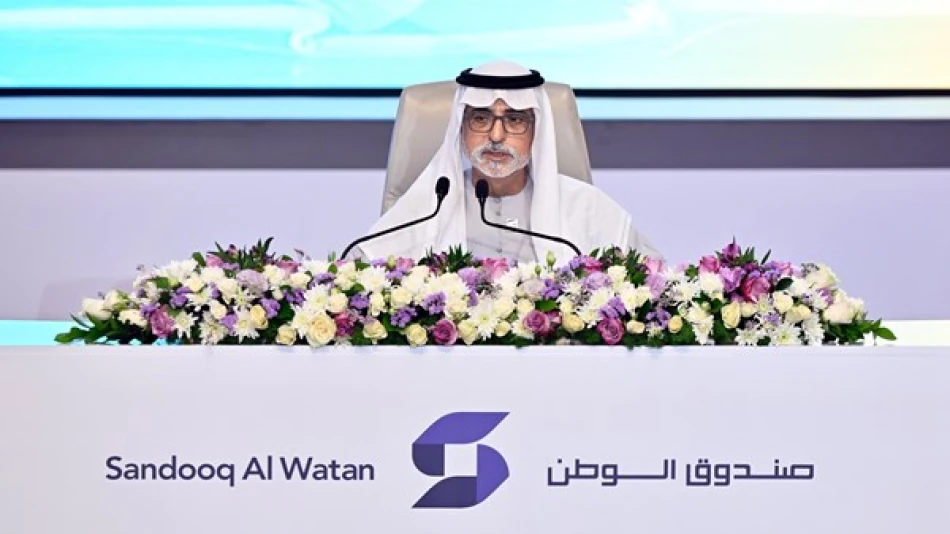
Sheikh Nahyan Inaugurates Thought Leaders Forum to Strengthen National Identity
UAE Launches Major Cultural Initiative to Strengthen National Identity Through Creative Arts
The UAE has unveiled an ambitious new program aimed at mobilizing over 1,200 writers, artists, and researchers to reinforce Emirati national identity through cultural production. The initiative, spearheaded by the Al Watan Fund in partnership with Mohammed bin Rashid Library, signals the government's strategic recognition that cultural soft power requires systematic investment and coordination with the creative community.
High-Level Government Commitment to Cultural Strategy
Sheikh Nahyan bin Mubarak Al Nahyan, Minister of Tolerance and Coexistence and Chairman of Al Watan Fund, emphasized that the initiative stems directly from President Sheikh Mohammed bin Zayed Al Nahyan's directives prioritizing national identity as a cornerstone of national development. This top-down endorsement suggests the UAE views cultural identity not as a peripheral concern, but as integral to its broader nation-building strategy.
The minister described the partnership with Mohammed bin Rashid Library as leveraging a "leading cultural and knowledge beacon" to achieve the UAE's goals of enabling an advanced cultural movement. This language indicates the government sees cultural institutions as infrastructure requiring the same strategic attention as ports or technology hubs.
Defining Emirati Identity in Global Context
Sheikh Nahyan articulated the UAE's national identity as simultaneously Arab, Islamic, and global — a formulation that balances cultural authenticity with international openness. This positioning reflects the UAE's broader economic strategy of serving as a bridge between East and West, traditional and modern.
The emphasis on identity as "spiritual nourishment" that achieves social unity and forms part of the state's soft power reveals sophisticated thinking about culture's role in governance. Unlike countries that view cultural policy as primarily domestic, the UAE explicitly frames identity work as contributing to international influence.
Financial Incentives and Digital Infrastructure
The Al Watan Fund will provide material and moral support through incentives, grants, awards, recognition ceremonies, and publication of outstanding works. More significantly, the fund has launched a dedicated website to receive proposals and initiatives from creators, suggesting a systematic approach to identifying and nurturing cultural talent.
This digital platform approach mirrors successful innovation ecosystems in other sectors, indicating the UAE is applying lessons from its economic diversification strategy to cultural development.
Comparing Regional Cultural Strategies
The UAE's coordinated approach contrasts with more fragmented cultural policies elsewhere in the Gulf. While Saudi Arabia's Vision 2030 includes major cultural investments, the UAE's focus on identity-specific content creation rather than just cultural infrastructure suggests a more targeted strategy.
The involvement of over 500 writers and researchers in the "Our Life in the UAE" initiative demonstrates scale that few countries achieve in cultural mobilization efforts. This mass participation approach resembles successful cultural movements in Singapore and South Korea, where government coordination helped amplify creative output.
Multi-Disciplinary Creative Engagement
The forum's sessions revealed strategic thinking about different artistic mediums' roles in identity formation. Theater leader Ismail Abdullah emphasized theater's central role in enhancing national identity, while visual artist Khalil Abdul Wahid highlighted fine arts' capacity for identity expression. Photographer Ali Al Sharif noted photography's ability to document national identity within a creative framework.
This medium-specific approach suggests recognition that different art forms serve distinct functions in cultural strategy — theater for community building, visual arts for symbolic representation, photography for historical documentation.
Implications for UAE's Soft Power Strategy
The initiative represents a maturing of the UAE's soft power approach. Rather than relying primarily on architectural landmarks and international events, the country is investing in content creation and narrative development. This shift toward cultural production could prove more sustainable and authentic than infrastructure-heavy strategies.
For international observers, the program signals the UAE's intention to compete not just economically but culturally in the global arena. The systematic approach to cultural development, combined with significant resources and high-level political support, positions the UAE to potentially become a more influential cultural exporter in the Middle East region.
The success of this initiative could provide a model for other Gulf states seeking to balance traditional identity with global integration, making it a significant development beyond the UAE's borders.
Most Viewed News

 Layla Al Mansoori
Layla Al Mansoori






